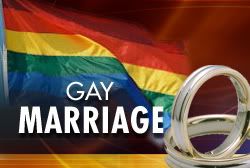Today I happened to find a Boston Globe article by Peter Gomes who is an American Baptist minister and professor of theology at Harvard University. It explores the history of marriage in the Commonwealth of Massachusetts as well as the appropriateness of the courts deciding that the rights of civil marriage should be extended to gays and lesbians. The article is entitled, "For Massachusetts, a chance and a choice" and I want to bring you these excerpts:
No clergy of any denomination are required to wed anyone of whose union they do not approve: There is no civil right to be married in church or with its blessing. The civil law is just that, and the distinction between it and ecclesiastical law is as important as the necessary distinction between church and state. Surely, after two years of protracted debate between church law and civil law in the child-abuse scandals we should appreciate the necessity of these distinctions.
...
"Judicial tyranny" is a phrase usually heard from those whose prejudices have not been sustained by a court's decision. Happily, the fundamental rights of citizens in this Commonwealth and republic are in the long run defended against another form of tyranny even more dangerous, the tyranny of the majority.
Legislatures more often than not are subject to the prevailing passions of any majority that can muster sufficient votes; rarely are legislatures in the first instance instruments of social change. It was, after all, legislators who, reflecting the views of those who elected them, kept in place every oppressive law on the books until challenged by aggrieved citizens who sought relief in the courts.
...
The defense of marriage demands much more than legislative manipulation enshrining the status quo. The defenders of traditional marriage argue that marriage has been a heterosexual affair since "Adam and Eve, not Adam and Steve," and at the same time they argue that this exclusively heterosexual institution is in serious trouble.
Logic would suggest that such troubles as marriage experiences cannot be laid at the door of those who have been, at least until Goodridge [the court decision that allowed gay marriage in Massachusetts], rigorously excluded from it.
To extend the civil right of marriage to homosexuals will neither solve nor complicate the problems already inherent in marriage, but what it will do is permit a whole class of persons, our fellow citizens under the law heretofore irrationally deprived of a civil right, both to benefit from and participate in a valuable yet vulnerable institution which in our changing society needs all the help it can get.
If you are married, let me ask you two questions:
1. How can the ability of two gay people to get married hurt your marriage?
2. If your marriage is in trouble, how will a constitutional amendment banning gay marriage help improve your marriage?


No comments:
Post a Comment
New policy: Anonymous posts must be signed or they will be deleted. Pick a name, any name (it could be Paperclip or Doorknob), but identify yourself in some way. Thank you.